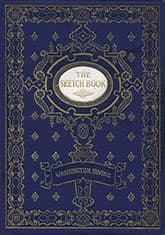The Legend of Sleepy Hollow
Critique • Quotes • At the movies
 1895 edition of story collection
1895 edition of story collectionFirst published
1820 in serially published The Sketch Book of Geoffrey Crayon, Gent.
Literary form
Story
Genres
Literary, Gothic, fantasy, horror
Writing language
English
Author's country
United States
Length
Approx. 12,000 words
Witty and skeptical ghost story
First thing to remember about "The Legend of Sleepy Hollow" is that it's a short work. By word count it qualifies as a story, as opposed to a novella or a novel, which it is sometimes called.
It's to the credit of Washington Irving that the story has become better known than most novels and that in so few words it establishes an enduring character: Ichabod Crane. Like many early American characters of literature, he's an eccentric—visually grotesque and yet vain, educated but too clever by half.
We're never quite sure if we're meant to sympathize with him or laugh at him. And whether his comeuppance in the end makes the story a shocker or a comedy.
"The Legend of Sleepy Hollow" has also become a classic ghost story—though it turns out to be a classic of Yankee skepticism in this regard, poking gentle fun at the superstitions of the time. In this we can see Irving as a forerunner of Mark Twain and other down-to-earth, everyman writers to come.
An indirect tall tale
Also similarly to Twain also, Irving doesn't take his own narrative too seriously. He knows he's telling a tall tale that likely has prosaic explanations, as acknowledged in a postscript detailing how he supposedly heard the story he's just related.
Almost more important than the plot in this story is the indirect way Irving lays it out. At first reading it may seem as though he digresses too much, spends too much time on the atmosphere of the small community hidden from civilization, piles on too much detail about its denizens, goes on too much about Crane and his ridiculous hopes.
And those long, if entertaining, sentences! (See that drawn-out first line alone.)
But once you've got the narrative out of the way, go back and read the story again. You can then enjoy the subtle (sometimes not so subtle) wit as Irving lampoons all sides and his obvious relish for the peculiarities of human nature.
"The Legend of Sleepy Hollow", once you're over the Headless Horseman, is vastly entertaining in a slow read.
And then when you reach Ichabod's Crane's frantic encounter with the ghostly rider again and the supposed twist ending, it's all the more fun.
— Eric
Critique • Quotes • At the movies

